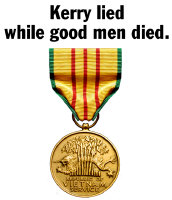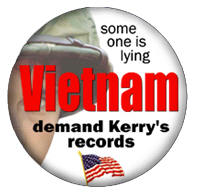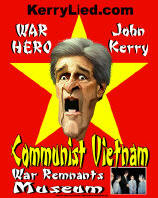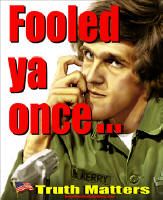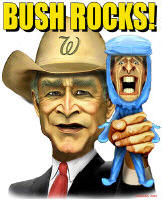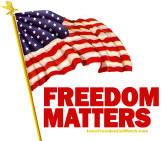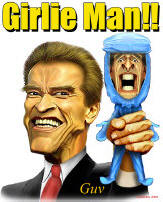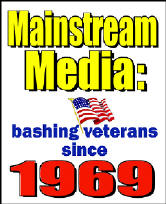Another Bush bashing book
The U. K. Mirror reports on the latest Bush-bashing book. What effect
another assault will have this late in the campaign is not certain. It
has long been admitted that Bush early youth was misspent before his
religious conversion. Now, it is alleged that Laura Bush was a
participant in that lifestyle. This may be an accusation too far. Here
is part of the Mirror report:
George W. Bush snorted cocaine at Camp David, a new book claims. His
wife Laura also allegedly tried cannabis in her youth.
Author Kitty Kelley says in her biography The Family: The Real Story
of the Bush Dynasty, that the US President first used coke at
university in the mid-1960s.
She quotes his former sister-in-law Sharon Bush who claims: "Bush did
coke at Camp David when his father was President, and not just once
either."
Other acquaintances allege that as a 26-year-old National Guard, Bush
"liked to sneak out back for a joint or into the bathroom for a line
of cocaine".
Hey – that’s MY line!
William Kristol, editor of The Weekly Standard, nails Kerry on his
borrowed Howard Dean line:
JOHN KERRY said yesterday that Iraq was "the wrong war in the wrong
place at the wrong time." Translation: We would be better off if
Saddam Hussein were still in power.
Not an unheard of point of view. Indeed, as President Bush pointed out
today, it was Howard Dean's position during the primary season. On
December 15, 2003, in a speech at the Pacific Council on International
Policy in Los Angeles, Dean said that "the capture of Saddam Hussein
has not made America safer." Dean also said, "The difficulties and
tragedies we have faced in Iraq show the administration launched the
war in the wrong way, at the wrong time, with inadequate planning,
insufficient help, and at the extraordinary cost, so far, of $166
billion."
But who challenged Dean immediately? John Kerry. On December 16, at
Drake University in Iowa, Kerry asserted that "those who doubted
whether Iraq or the world would be better off without Saddam Hussein,
and those who believe today that we are not safer with his capture,
don't have the judgment to be president or the credibility to be
elected president."
Kerry was right then.
In an
ABC News report, President Bush also points out the error of
John Kerry’s flip flopping ways:
Kerry "woke up yesterday morning with yet another new position, and
this one's not even his own; it is that of his one-time rival, Howard
Dean," Bush told thousands of supporters at a rally in the Kansas City
suburbs.
Bush said Kerry "even used the same words Howard Dean did back when he
supposedly disagreed with him ... Senator Kerry flip-flops. We were
right to make America safer by removing Saddam Hussein from power."
Bush went on to say that Kerry is blocking lawsuit restrictions that
would help generate new jobs here in America:
"I understand my opponent changes positions a lot, but for 20 years
he's been one of the trial lawyers' most reliable allies in the
Senate," the president said.
Bush, campaigning in suburbs that he won four years ago, said Kerry
has consistently voted against legal changes that would protect
workers and businesses.
"His fellow lawyers have responded with millions of dollars in
campaign donations," said the president.
Bush said that "ending junk lawsuits" is necessary to create more jobs
and that "the cost to our economy of litigation is conservatively
estimated to be over $230 billion a year." Kerry running mate John
Edwards is a personal injury lawyer.
Another Kerry flip-flop
Sen. John Kerry has of late blamed President Bush for signing a drug
bill that prohibits the government from negotiating with the drug
companies to lower drug prices. A fact that would pass higher drug
costs on to others. However, research has found that four years ago
Kerry sponsored legislation that would prevent the government from
negotiating with drug companies.
Senate records from 2000 show that Kerry joined 32 other Democrats to
support a Medicare drug proposal that explicitly prohibited the
government from negotiating prices "or otherwise interfere with the
competitive nature of providing a prescription drug benefit through
private entities."
Kerry disrupted
The
LA Times reports on a Kerry front porch event in
Canonsburg, Pa. The new Kerry staff may want to implement better crowd
control over its events. Bush supporters on the street clearly
disrupted the Kerry event and showed Kerry that not everyone believes
in his message:
Before 8 a.m. Monday, the lines were already drawn.
On one end of the road stood a group clutching Kerry signs, eagerly
awaiting his arrival. At the other, the gaggle of Bush supporters
waved hand-lettered placards with messages like "John Kerry for
president of France" and "I voted for Kerry before I voted against
him."
Yesterday's Lies: Steve Pitkin
and the Winter Soldiers
[NOTE: The following is a report on the ongoing battle for truth
regarding John Kerry and his 1971 Senate testimony. It reveals the
extent to which Kerry’s group, Vietnam Veterans Against the War,
pressured others to lie about atrocities to the American public. This
report can also be found on
WinterSoldier.com]
My name is Steve Pitkin, age 20, from Baltimore. I served with the
9th Division from May of '69 until I was airvaced in July of '69. I'll
testify about the beating of civilians and enemy personnel,
destruction of villages, indiscriminate use of artillery, the general
racism and the attitude of the American GI toward the Vietnamese. I
will also talk about some of the problems of the GIs toward one
another and the hassle with officers.
-- Steve Pitkin, Winter Soldier Investigation, February 1, 1971.
----------
Steve Pitkin never intended to speak at the Winter Soldier
Investigation. He agreed to come to Detroit with John Kerry and Scott
Camil in January of 1971 mostly to support his fellow veterans, but
also to see David Crosby and Graham Nash perform and hopefully meet a
few girls. He didn’t really have any place else to go.
Unlike most members of Vietnam Veterans Against the War, Pitkin had
seen combat in Vietnam. He was caught in a mortar attack shortly after
arriving in country as a Private First Class, and suffered minor
wounds to both legs. During the months that followed his injuries
became infected and "jungle rot" set in. He was eventually medivaced
to an Army hospital in Okinawa, where the doctors gave him anti-fungals
and antibiotics, and managed to save his feet. Specialist Pitkin would
leave the Army with a Purple Heart, an honorable discharge, and a
lifetime case of hepatitis C from the transfusions.
Back in the States, Pitkin did not receive a hero's welcome. At Travis
Air Force Base in California he was showered with feces thrown by
anti-war protestors. Later, while he waited in his Class A uniform for
a plane at San Francisco International Airport, people stopped to
snarl obscenities and occasionally spit. Even a World War II veteran
paused to come over and call him a coward. He went back home to
Baltimore, but it wasn’t home any more. Steve Pitkin was 19 years old.
"I was in bad shape," Pitkin recalls. "My family was against the war,
and so were all my old friends. I had things I wanted to say, but
there was nobody to listen. I was angry at our government which should
have known better than to let us die in a conflict it had no intention
of winning, and I was furious at the American media for making us out
to be baby-killers and telling lies about what they saw."
Confused and depressed, Pitkin signed up for classes at Catonsville
Community College outside of Baltimore. There he met Scott Camil, who
was talking up a new organization he described as a "brotherhood" of
Vietnam veterans. Pitkin started going to Vietnam Veterans Against the
War meetings at the campus, hoping to find some people he could talk
to about his experiences. Pitkin says he "had no inkling" that VVAW
leaders were meeting with North Vietnamese and Vietcong
representatives, or that the VVAW consistently supported their
positions. He thought the VVAW was just an alternative to older
organizations such as the VFW, where so many Vietnam vets felt
unwelcome.
----------
In January of 1971, Pitkin was invited to go to Detroit for the VVAW's
"Winter Soldier Investigation," a national conference intended to
convince the public that American troops were routinely committing war
crimes in Vietnam. "I was just going to show support for the guys who
were already picked out to testify," said Pitkin. "Fighting in the war
was terrible enough -– I shot people -- but I never saw any atrocities
against civilians. The Vietcong hung up tribal chiefs and disemboweled
them in front of their own families –- they did that to their own
people. I never saw Americans do anything like that."
The Baltimore contingent met up with other VVAW members in Washington,
where they were loaded into rental vans with no back seats. It was
freezing cold in Pitkin's van, and Kerry and Camil -– the two former
officers -- were in the front where all the heat was, which made for a
long drive. Pitkin was unimpressed with the tall, aloof Kerry, who
rarely spoke to anyone other than the organization’s leaders, and
tagged Kerry with the nickname "Lurch" after the Addams Family TV
character. The ragtag group eventually made it to Detroit, got lost
for a while, and then spent the night at somebody's house. The
conference was held at a Howard Johnson’s motel, in a room Pitkin
remembers as having big concrete posts and no windows, with press
lights glaring down on the participants. An entourage of VVAW leaders
and reporters always surrounded John Kerry, who, Pitkin thought,
looked like he was running for President.
Pitkin watched for a day or so while his fellow VVAW members told
stories about horrible things they claimed to have done or witnessed
in Vietnam. He noticed other people, civilians, going around to the
VVAW members and "bombarding them, laying on the guilt," as they told
the veterans they had committed unspeakable crimes, but could make
amends by testifying against the war.
On the second day of the conference, Pitkin was surrounded by a group
of the event's leaders, who said they needed more witnesses and wanted
him to speak. Pitkin protested that he didn’t have anything to say.
Kerry said, "Surely you had to have seen some of the atrocities."
Pitkin insisted that he hadn't, and the group's mood turned menacing.
One of the other leaders leaned in and whispered, "It’s a long walk
back to Baltimore." Pitkin finally agreed to "testify." The Winter
Soldier leaders told Pitkin exactly what they wanted -– stories about
rape, brutality, shooting prisoners, and racism. Kerry assured him
that "the American people will be grateful for what you have to say."
----------
Many of the vets, particularly the vets participating in this
panel, have expressed the fact that they could go on and on for a long
time, talking about various instances of brutality, torture, rape,
everything that's been talked about here for the last two days. But
one thing they felt was very important and which hasn't, in a sense,
been done by many of the veterans was to say why this happened. What
happens to them that this happens and how these things came about.
Steve Pitkin in particular felt the need to try and express something
about how these men become animals in a sense. I know several of the
other vets on the panel want to mention it very briefly. So Steve why
don't you start off?
-- Moderator, Miscellaneous Panel, Winter Soldier Investigation,
February 1, 1971 [Note: the moderators for this session were VVAW
founder Jan Crumb and Executive Committee member John Kerry]
----------
Pitkin appears several times in the documentary film "Winter Soldier,"
where he comes across as vague and somewhat stunned, especially while
being questioned by John Kerry in a preliminary interview. He seems
overwhelmed at having to relive his harrowing experiences in Vietnam.
But Steve Pitkin says today that what the film actually shows are his
efforts to avoid answering Kerry’s questions at all.
During the formal hearings, Pitkin started to slam the press for
misrepresenting what GIs really did in Vietnam, but a woman he
believes was Jane Fonda shot him an astonished look and started to
stand up. Steve could see other members of the group getting ready to
cut him off, so he changed course and made up a few things he thought
they would be willing to accept. "Everything I said about atrocities
and racism was a lie. My unit never went out with the intention of
doing anything but its job. And I never saw black soldiers treated
differently, get picked out for the worst or most dangerous jobs, or
anything like that. There were some guys, shirkers, who would
intentionally injure themselves to get sent home, so I talked about
that for a while. But the fact is I lied my ass off, and I'm not proud
of it. I didn't think it would ever amount to anything."
After the 3-day conference ended, everybody piled back into the vans
and headed home. Nobody had much to say to Pitkin. A month or two
later he was contacted by a reporter for Life Magazine who asked about
war crimes and atrocities. "I didn’t tell him what he wanted to hear,"
said Pitkin. Nothing he said was included in the final story.
----------
In April, Steve Pitkin went down to Washington to check out the VVAW's
weeklong "Dewey Canyon III" protest, where he "ran into a lot of guys
who couldn’t answer questions about what unit they were in." At one
point he met up with leftist icon Jerry Rubin, who was wrapped in a
Vietcong flag. Pitkin told him to take it off. Rubin shrugged, dropped
the flag, and walked away. Pitkin and two or three like-minded
veterans formed a patrol, confiscating Vietcong flags and T-shirts
from protestors and daring them to start something. Nobody took them
up on it.
Pitkin was present for the infamous "medal toss" event on Friday,
where VVAW members yelled obscenities and threats against the
government into a microphone, then threw military decorations and
papers over a fence in front of the U.S. Capitol. A guy with long hair
stood nearby holding a bag filled with military ribbons and a few
medals, handing them out. Pitkin noticed that most of the decorations
weren't right for Vietnam combat veterans -– some, in fact, were from
the Korean War -– and overheard remarks that the VVAW had cleaned out
the local Army-Navy stores the day before. Disgusted, he grabbed a
handful of ribbons and threw them, not at the Capitol, but at the
throng of reporters crowding close to the microphone, and stalked
away.
After Dewey Canyon III, Pitkin was no longer invited to VVAW meetings
or events, which was fine with him. He soon went back into the
military, joining the 5/20th Special Forces Group of the Maryland
National Guard in 1974, and graduating from paratrooper "jump school"
with honors in 1976, but was unable to get back on full time active
duty in the Army. Pitkin joined the Coast Guard in 1978 and served
there until his retirement in May 1997.
Steve Pitkin wants to apologize to Vietnam veterans for what he did
and said at the Winter Soldier Investigation. "The VVAW found me
during a difficult time in my life, and I let them use me to advance
their political agenda. They pressured me to tell their lies, but
that's no excuse for what I did. I just want people to know the truth
and to make amends as best I can. I'd hate to see the troops serving
today have to go through what Vietnam veterans did."
Scott Swett
September 6, 2004
WinterSoldier.com
----------
Steve Pitkin Affadavit, August 31, 2004
Steve Pitkin DD-214
Steve Pitkin WSI testimony
Steve Pitkin WSI video clips -- February 1, 1971 (4:16, 1.6MB)
Kerry co-sponsored bill banning
the shotgun he waved
CNSNews.com - Sen. John F. Kerry has earned a "Labor Day goose
egg" from a Second Amendment group, for being a "first-class
hypocrite."
The Citizens Committee for the Right to Keep and Bear Arms (CCRKBA)
was responding to a Labor Day picnic in Racine, W. Va., at which Kerry
received a rifle as a gift from the United Mine Workers of America.
The Associated Press circulated a photograph of the Democratic
presidential candidate holding the rifle.
After receiving the rifle on Monday, Kerry was quoted as saying, "I
thank you for the gift, but I can't take it to the debate with me" --
an apparent reference to his upcoming political debate with President
George W. Bush.
John Michael Snyder, CCRKBA public affairs director, accused Kerry of
pandering to pro-gun-rights voters by portraying himself as a gun
owner and hunter, but also saying he would never consider shooting a
deer with an AK-47.
"This does not wash with America's gun owners," Snyder said. "The
Second Amendment isn't about duck hunting. It is about the
right to keep and bear arms for defense of life and property. Some gun
owners are doing that right now in Florida as they protect their
property from looters in the wake of Hurricanes Charley and Frances,"
Snyder noted.
Snyder said Kerry, just like his fellow senator from Massachusetts,
Edward Kennedy, "has been a reliable vote for the anti-gun special
interests.
"Just this spring, he came back from the campaign hustings to vote for
a measure by anti-gun Sens. Dianne Feinstein of California and Charles
Schumer of New York to extend a ban on the manufacture and importation
of certain semiautomatic firearms beyond next week's scheduled sunset
date. He also voted for a measure that would have outlawed the private
sale of firearms at gun shows unless the buyer agrees to a background
check," Snyder said.
"Kerry's not fooling us," Snyder added. "His 100 percent ratings from
the Brady Campaign to Prevent Gun Violence, the anti-gun American Bar
Association's Special Committee on Gun Violence, and the Coalition to
Stop Gun Violence just add up to a big goose egg from CCRKBA."
As CNSNews.comreported, Sen. Kerry has adopted a new strategy
when it comes to firearms. His desire to be viewed as a gun-toting
Democrat has left the gun control lobby noticeably silent during the
2004 presidential campaign, relegated to the sidelines on an issue
that played a significant role in the election four years ago.

